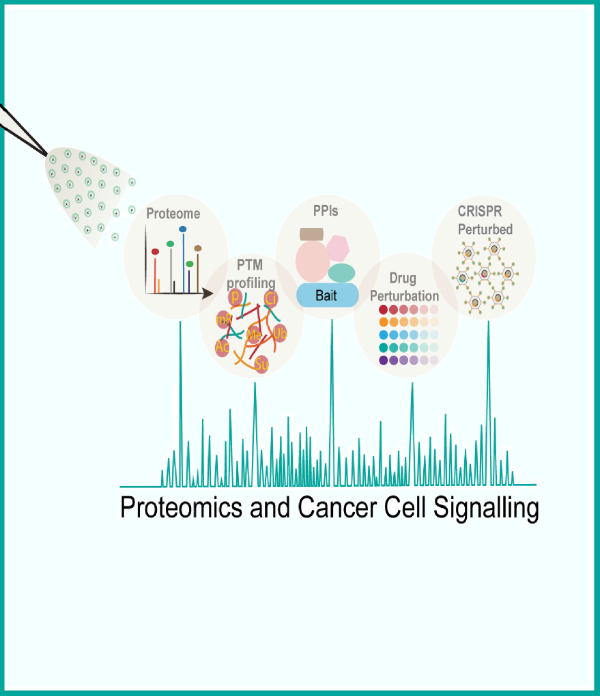Proteomics and cancer cell signaling
The overarching goal of our work is to understand cancer at the proteomic level and to thus inform and develop new strategies for treatment. We currently investigate tumors entities such as Osteosarcoma and Leukemia’s such as T-cell acute lymphoblastic leukemia, B-cell acute lymphoblastic leukemia, Acute Myeloid Leukemia. Our research group consists of physician scientists, geneticists and investigators with a strong background and track-record in high-sensitivity & high-throughput mass-spectrometry (MS) technology platforms and in implementing analytical pipelines (bioinformatics, multiomics data integration).
We are interested in studying the mechanisms of cancer development and progression utilizing cutting-edge mass spectrometry (MS) technology and systems biology approaches. We aim to study how these mechanisms determine clinical phenotype and response to cancer therapy. We like to perform ambitious research projects in a collaborative, fun, and team-oriented environment. We have formed a strong network of clinical and research collaborations in Germany and internationally to pursue innovative studies.
We welcome applications for master, graduate, and post-doctoral positions. For post-doc we also encourage applications for external fellowships. We seek highly ambitious and motivated candidates who share our commitments to science and passion for interdisciplinary research in MS-technology, medicine, cancer biology, and systems biology or similar. Interested candidates are welcome to reach out to our group leader.
Proteins are fundamental, functional unit of cells and are drug targets in treating disease, esp cancer. However clinical decision for treating tumor is largely not based on proteome expression of tumors. This is partly due to lack of deep proteome profiles of many tumor entities. With the advent of highly sensitive mass spectrometry and high throughput sample preparation workflow we position our lab to comprehensive characterize the proteomic landscape of tumors and integrate with genomic and clinical data, a multiomic approach to uncover protein targets for treating cancer entities.
In general, cancer has been viewed as a process governed by genetic mechanisms. However, is becoming more and more clear that non-genetic mechanisms may play an equally important role in cancer and its evolution. Particularly non-genetic events can lead to a variety of phenotypic states with distinct functional characteristics. These events have a crucial impact on cancer growth, progression, and response to drug treatment. Understanding the non-genetic molecular basis orchestrating the establishment and maintenance of such phenotypic states, particularly under treatment conditions may provide a tool to selectively direct the development of cancer cell populations towards less aggressive drug sensitive phenotypes. We utilize mass spectrometry-based proteomics to uncover the post-translational events governing the drug resistant state.
To define cellular phenotype and resolving heterogeneity at proteome level in an unbiased way will be more informative and powerful for interrogating the heterogeneity of biological functional states. Deciphering cancer cell heterogeneity with spatial, temporal, and functional resolution is crucial, particularly for establishing efficient therapy that targets all tumor subclones. In our lab we focus on developing, and applying the single cell proteomic approach to understand heterogeneity, dynamics and response to drug treatment, signaling and tumor cell fitness.
Drug resistance in cancer continues to be one of the principle limiting factors in achieving cure, and a major impediment to patient survival. We recently discovered that mRNA splicing factors plays a key role in mediating drug response in cancer cells. We showed (non-mutated)-splicing factor regulation by phosphorylation could alter the response to targeted therapy in cancer. How splicing factors as a class are post-translationally regulated by signaling pathways remains unknown, and this understanding may reveal novel mechanisms and therapeutic opportunities. Thus, the mechanism of mRNA splicing factors regulation in the context of various cancer relevant mutations and in different cancer entities, in particular hematological malignancies is one of the major focus of our work.
- Frank D, Patnana PK, Vorwerk J, Mao L, Mokada Gopal L, Jung N, Hennig T, Ruhnke L, Frenz JM, Kuppusamy M, Autry RJ, Wei L, Sun K, Ahmed H, Künstner A, Busch H, Müller H, Hutter S, Hoermann G, Liu L, Xie X, Al-Matary Y, Nimmagadda SC, Charles Cano F, Heuser M, Thol FR, Göhring G, Steinemann D, Thomale J, Leitner T, Fischer A, Rad R, Röllig C, Altmann H, Kunadt D, Berdel WE, Hüve J, Neumann F, Klingauf J, Calderon V, Opalka B, Dührsen U, Rosenbauer F, Dugas M, Varghese J, Reinhardt HCH, von Bubnoff N, Möröy T, Lenz G, Batcha AMN, Giorgi M, Selvam M, Wang ES, McWeeney SK, Tyner JW, Stölzel F, Mann M#, Jayavelu AK#, Khandanpour C#. Germline variant GFI1-36N affects DNA repair and sensitizes AML cells to DNA damage and repair therapy Blood. 2023. Sep 26:blood.2022015752. doi: 10.1182/blood.2022015752
- Bahrami E, Schmid JP, Jurinovic V, Becker M, Wirth AK, Ludwig R, Kreissig S, Duque Angel TV, Amend D, Hunt K, Öllinger R, Rad R, Frenz JM, Solovey M, Ziemann F, Mann M, Vick B, Wichmann C, Herold T, Jayavelu AK#, Jeremias I#. Combined proteomics and CRISPR‒Cas9 screens in PDX identify ADAM10 as essential for leukemia in vivo. Mol Cancer. 2023 Jul 8;22(1):10. doi: 10.1186/s12943-023-01803-0
- Jayavelu AK *, Wolf S*, Buettner F *, Alexe G , Häupl B, Comoglio F, Schneider C, Doebele C, Fuhrmann D, Wagner S, Donato E, Andresen C, Wilke A, Zindel A, Splettstoesser B, Plessmann U, Münch S, Elardat KA, Makowka P, Acker F, Enssle J, Cremer A , Schnuetgen F, Kurrle N, Chapuy B, Löber J, Hartmann S, Wild P, Wittig I, Huebschmann D, Kaderali L, Cox J, Brüne B, Röllig C, Thiede C, Steffen B, Bornhäuser M, Trumpp A, Urlaub H, Stegmaier K, Serve H#, Mann M# and Oellerich T#. The Proteogenomic Subtypes of Acute Myeloid Leukemia. Cancer Cell. 2022 Feb 28:S1535-6108(22)00058-7
- Haider N*, Lebastchi J*, Jayavelu AK*, Batista TM, Pan H, Dreyfuss JM, Carcamo-Orive I, Knowles JW, Mann M, Kahn CR. Signaling defects associated with insulin resistance in nondiabetic and diabetic individuals and modification by sex. J Clin Invest. 2021. Nov 1;131(21) PMID: 34506305 * shared first-authors.
- Jayavelu AK, Schnöder TM, Perner F, Herzog C, Meiler A, Krishnamoorty G, Mohr J, , Kathner C, Stephan BE, Austin R, Brandt S, Palandri F, Odenwald K, Schröder N, Isermann B, Edlich F, Sinha AU, Ungelenk M, Hübner CA, Zeiser R, Jilg S, Jost PJ, Mullally A, Bullinger L, Mertens PR, Lane SW, Mann M* and Heidel FH*. Splicing factor Ybx1 maintains persistent Jak2-mutated neoplasms. Nature. 2020 Dec;588(7836):157-163.
- Jayavelu AK, Müller JP, Bauer R, Böhmer SA, Lässig J, Cerny-Reiterer S, Sperr WR, Valent P, Maurer B, Moriggl R, Schörder K, Shah AM, Scholl S, Frey S, Fisher T, Heidel HF and Böhmer FD. NOX4-driven ROS formation mediates PTP inactivation and cell transformation in FLT3-ITD positive AML cells. Leukemia, 2016 Feb;30(2):473-83.
- Dr. Ashok Kumar Jayavelu (Group leader)
- Yongjie Wang (Postdoc)
- Lavanya Mokada Gopal (Postdoc)
- Lianghao Mao (Postdoc)
- Yuan Feng (Postdoc)
- Dorian Drogosivic (PhD)
- Archisman Maitra (PhD)
- Kanchana Maharjan (PhD)
- Marianna Kombou (Master student)
- Aishwarya Rajamohan (RA)
- Wurigamule Leibe (TA)
- Nicole Dickemann (TA)

Postal address:
KiTZ - Hopp Children's Cancer Center Heidelberg
Im Neuenheimer Feld 350
D- 69120 Heidelberg

